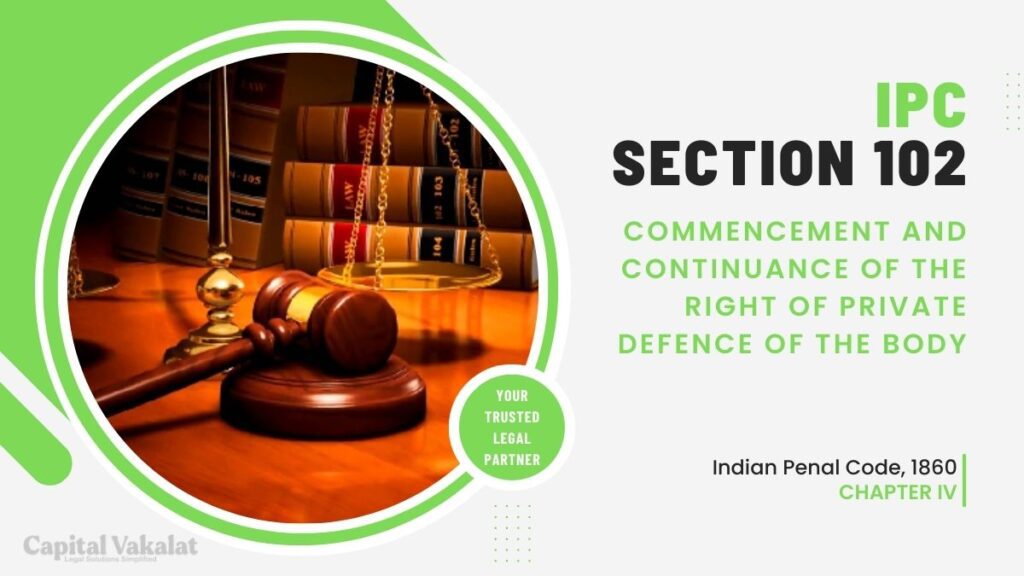In the realm of criminal law, the right to defend oneself is a fundamental aspect that ensures the safety and security of individuals. Section 102 of the Indian Penal Code (IPC) plays a pivotal role in defining the circumstances under which an individual can exercise the right of private defence of the body.

In this article, we will delve into Section 102 IPC, exploring its provisions, the commencement of the right of private defence, and its continuance.
Introduction to Section 102 IPC
Section 102 of the IPC provides a legal framework for individuals to protect themselves when faced with unlawful aggression or threat to their body. It is essential to understand the nuances of this section to ensure that individuals can exercise their right to self-defence within the boundaries of the law.
Understanding Unlawful Aggression
Before delving into Section 102 IPC, it is crucial to comprehend what constitutes unlawful aggression. Unlawful aggression refers to any act that poses an immediate threat to one’s life or physical well-being. It may involve physical assault, an attempt to cause bodily harm, or even an overt threat of violence.
Commencement of the Right of Private Defence
The right of private defence comes into play when an individual reasonably believes that there is an imminent danger to their body. This belief must be based on reasonable grounds and not on mere apprehension. In simpler terms, a person cannot claim the right of private defence if there is no real and immediate threat.
The Proportionality Principle
One crucial aspect to consider when exercising the right of private defence is the principle of proportionality. This means that the force used in self-defence must be proportional to the threat faced. Excessive force may lead to legal consequences, so it’s essential to exercise this right judiciously.
Continuance of the Right of Private Defence
Section 102 IPC also addresses the continuance of the right of private defence. This right extends as long as the threat continues to exist. Once the threat ceases, so does the right to defend oneself with force.
The Role of Retreat
In some situations, individuals may be required to retreat or avoid the use of force if a safe escape is possible. However, this requirement is subject to several factors, including the severity of the threat and the ability to retreat safely.
Self-Defence Against Minor Offences
Section 102 IPC allows for the right of private defence against minor offences as well. If an individual reasonably believes that the use of force is necessary to prevent a minor offence that may result in bodily harm, they can exercise this right.
Reporting to Authorities
It’s important to note that even when exercising the right of private defence, individuals must report the incident to the appropriate authorities as soon as possible. Failure to do so may lead to legal complications.
Case Examples
To better understand the practical implications of Section 102 IPC, let’s explore a few case examples where individuals successfully exercised their right of private defence.
- Case 1: A homeowner using reasonable force to protect their family from armed intruders.
- Case 2: A person defending themselves from an assault by using necessary force to subdue the attacker.
- Case 3: A shopkeeper preventing theft and assault by apprehending a shoplifter.
Conclusion
In conclusion, Section 102 IPC is a vital provision in Indian criminal law that safeguards the right of individuals to defend themselves against unlawful aggression. It outlines the circumstances under which this right can be exercised, emphasizing the importance of proportionality and the continuance of the right. By understanding and responsibly applying this section, individuals can protect themselves and their loved ones while staying within the boundaries of the law.
FAQs
Is there a duty to retreat before using force in self-defence?
There may be a duty to retreat if it is safe and possible to do so, but it depends on the circumstances.
Do I need to report the incident to the authorities if I exercise the right of private defence?
Yes, it is essential to report the incident to the appropriate authorities as soon as possible.
Can I use self-defence against minor offences?
Yes, Section 102 IPC allows for the right of private defence against minor offences that may result in bodily harm.
What happens if I use excessive force in self-defence?
Using excessive force may result in legal consequences, including potential charges for assault or excessive use of force.